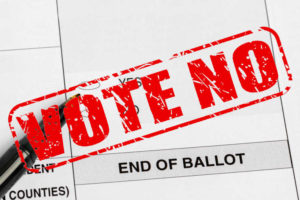When legislators or city administrators want to spend too much and rack up debt, they put some of the spending measures on the ballot. Usually, they put things on the ballot that are hard for voters to say no to. Measures like school funding and money for parks. Rarely will you see welfare payments or state pension funding increases up for a referendum vote. At Cato Institute, Chris Edwards explains some bonds on the ballot in 2022, and why those bonds should be voted against, and the spending measures rolled in budgets that legislators can be held accountable for. He writes:
Aside from choosing politicians for office this election, many voters will decide on important policy issues, such as whether their state and local governments should issue more debt. This year, four states have bond issues on the ballot and there are usually hundreds of local ones. Voters in Arlington County, Virginia, for example, will decide on six bonds for schools, transit, parks, and other items.
When higher state and local taxes are on the ballot, voters usually reject them. But, inconsistently, voters usually support bonds by large margins—often around 75–25—as in Arlington in recent years. Voters may not realize that general obligation bonds are equivalent to taxes. When they are issued, it results in higher taxes down the road than otherwise to pay the principal and interest.
Bond issues are particularly unjustified this year because most states have large budget surpluses. State and local tax revenues soared 10 percent in 2021 and may grow another 7 percent in 2022. In addition, the federal government showered the states with $1 trillion in pandemic‐related aid followed by hundreds of billions more aid in the 2021 infrastructure bill. Governments should be paying down debt right now, rather than issuing more debt.
In general, state and local governments should minimize or eliminate debt, as I argue here. Governments can fund their infrastructure on a pay‐as‐you‐go basis, meaning with ongoing taxes, fees, and charges. Some of the most frugal states in the nation issue very little debt.
Financing infrastructure with general obligation debt incurs interest costs and creates unneeded budget risks. This year, interest rates are rising, so it is a particularly bad time for governments to increase borrowing. State and local debt issuance also generates billions of dollars of fees for Wall Street middlemen, which is pure waste for the overall economy because pay‐as‐you‐go funding would avoid it.
New Mexico is asking voters to approve $19 million in debt for libraries and $215 million for schools and colleges. If the spending is really needed, couldn’t the state have included it in its $25 billion regular budget? After all, the state currently has a budget surplus of $2.5 billion. Similarly, Rhode Island is asking voters to approve $50 million in debt for environmental and recreational projects, yet the state has a $900 million budget surplus.
It is imprudent for states to impose costs on future residents when the costs can be paid now. Debt provides no free lunch. Rather than borrowing, policymakers should sequence their major projects and allocate a portion of ongoing tax revenues for construction and renovation.
I benefit from state and local parks and schools, but I always vote “no” on bond questions.
Action Line: Are you voting on bonds for your town or state? How will you vote? If your state or city officials can’t do what you want them to do without coming to you over and over at the ballot to avoid culpability, maybe it’s not new spending measures you need, but new officials. The most important vote you will make today is on who will represent you into the future. Choose wisely.
E.J. Smith - Your Survival Guy
Latest posts by E.J. Smith - Your Survival Guy (see all)
- A Word on Stocks - July 26, 2024
- Is Vanguard Too Big? What’s Next? - July 26, 2024
- Boomer Candy? - July 26, 2024
- My BEST Insider’s Guide to Key West - July 26, 2024
- Having Fun Yet? Nasdaq Worst Day in Years - July 25, 2024















